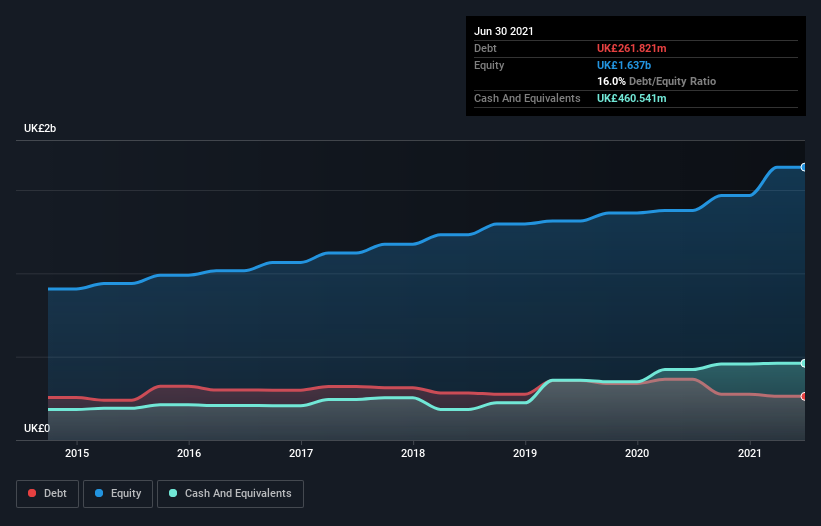
The external fund manager backed by Berkshire Hathaway's Charlie Munger, Li Lu, makes no bones about it when he says 'The biggest investment risk is not the volatility of prices, but whether you will suffer a permanent loss of capital.' When we think about how risky a company is, we always like to look at its use of debt, since debt overload can lead to ruin. We note that Grafton Group plc (LON:GFTU) does have debt on its balance sheet. But the real question is whether this debt is making the company risky.
What Risk Does Debt Bring?
Debt and other liabilities become risky for a business when it cannot easily fulfill those obligations, either with free cash flow or by raising capital at an attractive price. In the worst case scenario, a company can go bankrupt if it cannot pay its creditors. While that is not too common, we often do see indebted companies permanently diluting shareholders because lenders force them to raise capital at a distressed price. Having said that, the most common situation is where a company manages its debt reasonably well - and to its own advantage. The first thing to do when considering how much debt a business uses is to look at its cash and debt together.
See our latest analysis for Grafton Group
What Is Grafton Group's Net Debt?
The image below, which you can click on for greater detail, shows that Grafton Group had debt of UK£261.8m at the end of June 2021, a reduction from UK£364.4m over a year. However, its balance sheet shows it holds UK£460.5m in cash, so it actually has UK£198.7m net cash.

A Look At Grafton Group's Liabilities
Zooming in on the latest balance sheet data, we can see that Grafton Group had liabilities of UK£539.3m due within 12 months and liabilities of UK£752.5m due beyond that. Offsetting this, it had UK£460.5m in cash and UK£804.1m in receivables that were due within 12 months. So its liabilities total UK£27.1m more than the combination of its cash and short-term receivables.
This state of affairs indicates that Grafton Group's balance sheet looks quite solid, as its total liabilities are just about equal to its liquid assets. So while it's hard to imagine that the UK£3.25b company is struggling for cash, we still think it's worth monitoring its balance sheet. Despite its noteworthy liabilities, Grafton Group boasts net cash, so it's fair to say it does not have a heavy debt load!
On top of that, Grafton Group grew its EBIT by 98% over the last twelve months, and that growth will make it easier to handle its debt. There's no doubt that we learn most about debt from the balance sheet. But ultimately the future profitability of the business will decide if Grafton Group can strengthen its balance sheet over time. So if you want to see what the professionals think, you might find this free report on analyst profit forecasts to be interesting.
But our final consideration is also important, because a company cannot pay debt with paper profits; it needs cold hard cash. Grafton Group may have net cash on the balance sheet, but it is still interesting to look at how well the business converts its earnings before interest and tax (EBIT) to free cash flow, because that will influence both its need for, and its capacity to manage debt. Happily for any shareholders, Grafton Group actually produced more free cash flow than EBIT over the last three years. There's nothing better than incoming cash when it comes to staying in your lenders' good graces.
Summing up
We could understand if investors are concerned about Grafton Group's liabilities, but we can be reassured by the fact it has has net cash of UK£198.7m. The cherry on top was that in converted 118% of that EBIT to free cash flow, bringing in UK£399m. So we don't think Grafton Group's use of debt is risky. When analysing debt levels, the balance sheet is the obvious place to start. However, not all investment risk resides within the balance sheet - far from it. These risks can be hard to spot. Every company has them, and we've spotted 1 warning sign for Grafton Group you should know about.
When all is said and done, sometimes its easier to focus on companies that don't even need debt. Readers can access a list of growth stocks with zero net debt 100% free, right now.
If you decide to trade Grafton Group, use the lowest-cost* platform that is rated #1 Overall by Barron’s, Interactive Brokers. Trade stocks, options, futures, forex, bonds and funds on 135 markets, all from a single integrated account. Promoted
New: Manage All Your Stock Portfolios in One Place
We've created the ultimate portfolio companion for stock investors, and it's free.
• Connect an unlimited number of Portfolios and see your total in one currency
• Be alerted to new Warning Signs or Risks via email or mobile
• Track the Fair Value of your stocks
This article by Simply Wall St is general in nature. We provide commentary based on historical data and analyst forecasts only using an unbiased methodology and our articles are not intended to be financial advice. It does not constitute a recommendation to buy or sell any stock, and does not take account of your objectives, or your financial situation. We aim to bring you long-term focused analysis driven by fundamental data. Note that our analysis may not factor in the latest price-sensitive company announcements or qualitative material. Simply Wall St has no position in any stocks mentioned.
*Interactive Brokers Rated Lowest Cost Broker by StockBrokers.com Annual Online Review 2020
Have feedback on this article? Concerned about the content? Get in touch with us directly. Alternatively, email editorial-team (at) simplywallst.com.
About LSE:GFTU
Grafton Group
Engages in the distribution, retailing, and manufacturing businesses in Ireland, the Netherlands, Finland, and the United Kingdom.
Flawless balance sheet established dividend payer.
Similar Companies
Market Insights
Community Narratives



